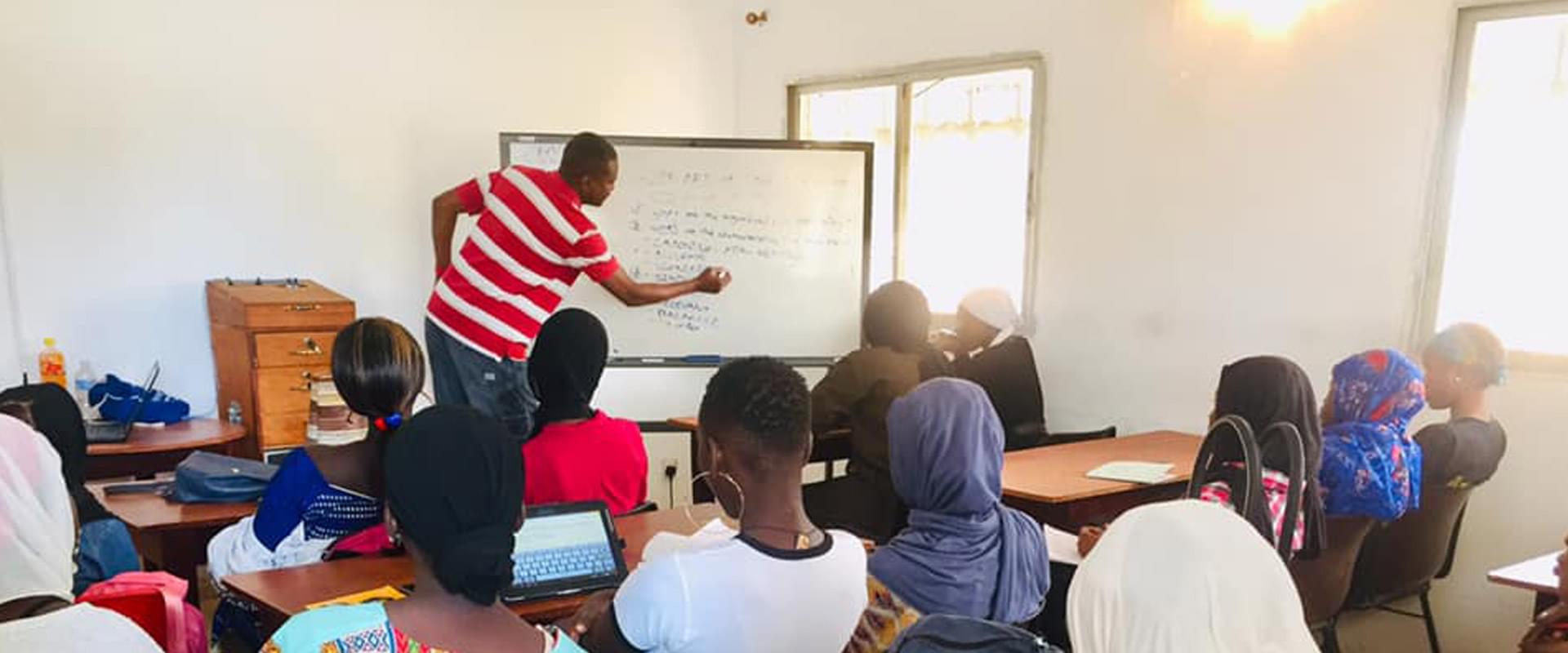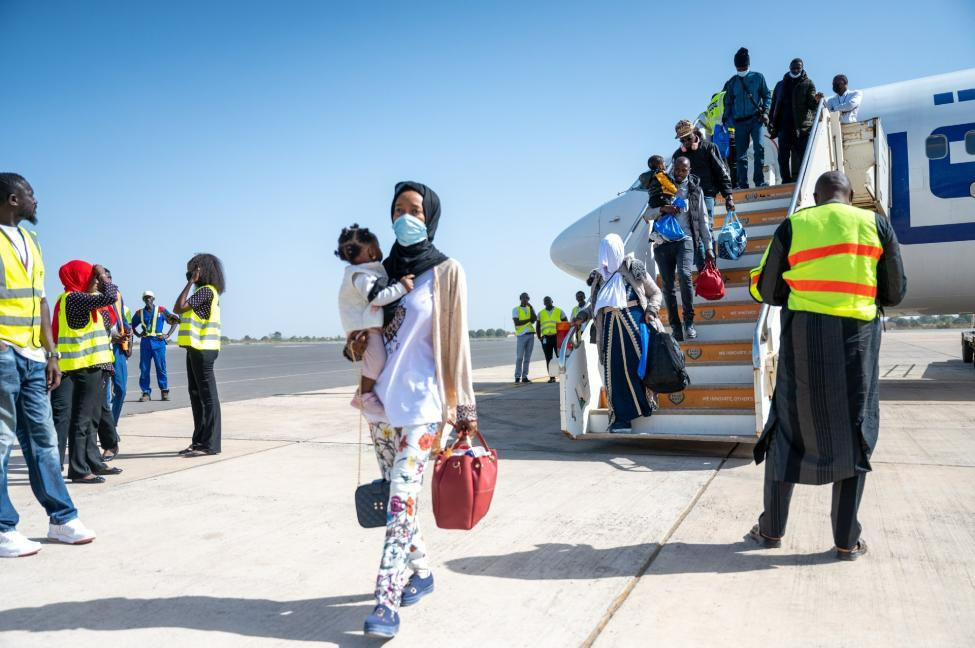
Nov 8, 2023 10:18 AM | Article By: Momodou Janneh Edited By: Isatou Keita

Picture credit: OM website
In the heart of West Africa, The Gambia, the smallest on the African mainland, has experienced a remarkable transformation amidst the surge of irregular migration that has gripped its youth. These intrepid souls set out in search of sustainable livelihoods and economic opportunities beyond their familiar horizons. While this journey has been fraught with challenges and risks, the return home has illuminated the story of resilience and rebirth.
From 2017 to August 31, 2022, approximately 3,600 Gambians stranded in Libya found their ray of hope through the International Organization for Migration's (IOM) Voluntary Humanitarian Return Programme. A further 1,895 migrants, unable to proceed with their perilous journey, were safely ushered back from Niger during the same period. These returns often stem from the horrors of exploitation and physical abuse at the hands of smugglers and traffickers, which threaten the migrants' very existence.
Upon their return, dozens of these brave individuals embark on a journey of self-discovery, bolstered by the guidance of dedicated mentors and counselors. This holistic support encompasses social and psychosocial assistance, as well as economic empowerment, thus enabling them to reintegrate into society, like the phoenix rising from its ashes.
However, reintegration is not without its trials. The likes of Saidybah Fatty, an erudite economist, emphasize the formidable hurdles that The Gambia faces in ensuring the successful reintegration of these migrant returnees. Their return often leaves them with meager savings, a financial paradox that impedes employment prospects and the initiation of businesses. Consequently, this can give birth to poverty and social exclusion, with a shadow of stigma and discrimination casting a pall over their attempts to rebuild relationships.
Yet, Mr. Fatty underscore the role of organizations like IOM in addressing these reintegration challenges. He exclaims, "IOM plays a pivotal role in steering migrant returnees through the labyrinth of challenges, championing humane and orderly migration for the greater good of all."
The psychological well-being of returnees is a distressing chapter in their reintegration saga. Mental health issues, including post-traumatic stress disorder (PTSD), anxiety, and depression, can cast a long shadow over the prospect of employment, the launch of businesses, and the rebuilding of relationships with family and friends.
The successful reintegration of these resilient souls has ramifications far beyond the individual; it reverberates through society. It uplifts their income, diminishes their dependence on social assistance, unlocks doors to saving and investing, and allows them to send precious remittances to their families. This virtuous cycle bolsters the labor force, spurs tax revenues, quells crime, fosters social harmony, and enriches societal well-being.
Take the story of Kemo Colley, a migrant returnee, a father of two who left the Gambia in 2015; he faced the chilly winds of stigma upon his return. Society often casts a dubious eye on returnees, perceiving them as individuals who could not complete their journey to Europe, relying on voluntary assistance to find their way back. This unfounded perception erodes their self-esteem and well-being.
In a bid to provide wings to these phoenixes, IOM typically furnishes integration packages designed to reignite their lives, making them employable and resilient. These packages are as diverse as the individuals are themselves, addressing economic, social, and psychosocial facets.
Colley, from the support received, now owns a poultry farm in his village in Siffoe. Kemo employs up to three people in his farm with his eldest son in charge of the finances. From the savings, Colley feeds the family and pays for the school fees and other necessities of the family and still with some to save.
“I have initially thought I failed when I came back, following the stressed from the reason I left but my situation now is a dream come true, I don’t think I will be able to have such if I was still there” Colley added.
Yet, it is vital to remember that not all returnees have the privilege of these reintegration packages. His story is similar to some of his mates, who are now in different ventures making a living for their families but still a different case for most of the underprivileged ones who see the reintegration efforts as means of discouraging them from embarking on the journey.
Mustapha Sonko, a Migration Officer at the Gambia National Youth Council, recognize the complexity of the challenge. Financial constraints, the labyrinth of reintegration information, high unemployment rates, and limited resources all conspire to compound the complexity of their journey.
The Gambia National Youth Council according to sonko joins hands with partners to ease the reintegration process. IOM, in particular, stands as a beacon in addressing migration-related issues. Their partnership extends through training, vigilant monitoring, and engaging sensitization programs aimed at deterring irregular migration.
Mustapha Sonko eloquently underscores that the benefits The Gambia can reap from triumphant reintegration programs are a formidable goal to achieve. All too often, these programs wear a cosmetic facade, with limited government resources earmarked for the reintegration endeavor. The success of The Gambia's voyage in this realm hinges on the depth of their engagement with the European Union (EU). Sonko said, “The government must give migration the attention it deserves, even perhaps birthing a dedicated ministry, while prioritizing the implementation of coherent migration policies.”
Source: IOM Facebook page
IOM's role in The Gambia shines through a comprehensive approach that addresses not only the economic but also the social and psychosocial needs of migrants and their communities. This multifaceted assistance encompasses medical and psychosocial support, the nurturing of small businesses, support for education and vocational training, and referrals to other available services.
The journey of migrant reintegration in The Gambia has been seen by many as a labyrinth of challenges, yet it carries the torch of hope, promising transformation for both individuals and society as a whole.
Comments (0)
7 Likes
Leave your thought here
Your email address will not be published. Required fields are marked *